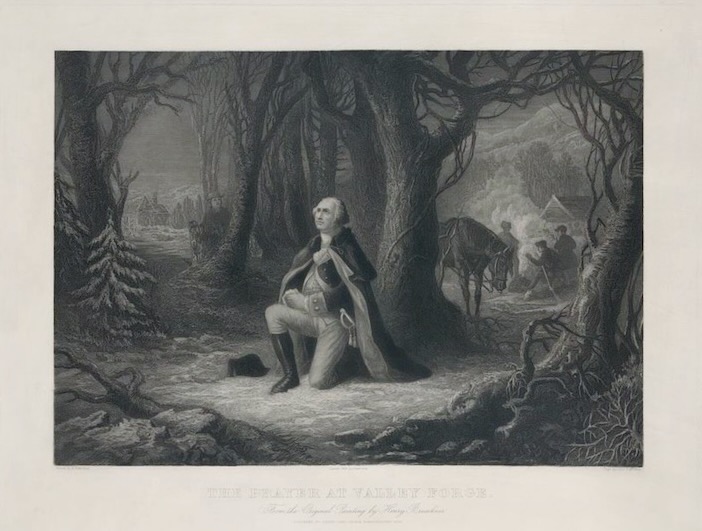Because Catholicism is incarnational, it strives to become inculturated in whatever culture it is found, like yeast and like salt.
If I lived in Scotland, I’d fancy hill walking, eat haggis with gusto (at least I’d try to), listen to a lot of jigs and reels, and play perhaps even more golf. Since I live in America, that land with a Statue of Liberty (not a Statue of the Common Good), I regard myself as bound to love liberty.
If I didn’t love liberty already: some of us hear “Give me liberty or give me death,” and it rings deep and rings true. In any case, I believe a Catholic American, as an American, is duty-bound to love liberty, and as a Catholic, he is obliged to discover its true meaning and show it.
Almost the first thing I’d want to say about liberty is that it is a glorious human good, to be desired as an end, not simply as a means.
I would quote Scripture in my defense, “creation itself will be set free from its bondage to decay and obtain the glorious liberty of the children of God,” says St. Paul. (Romans 8:21) He is speaking about the consummation, not the journey.
I would quote St. Augustine, “God created us without us: but he did not will to save us without us,” that is, without our consent. Therefore, to be saved is to be saved in freedom. I would refer to the teaching of St. Thomas that the whole of life in Christ is charity, but charity is friendship with God, and there cannot be friendship without freedom. Friendship may be defined as the freest form of human relationship.
I would quote Cardinal Ratzinger, writing about theologies of liberation: “The Gospel of Jesus Christ is a message of freedom and a force for liberation.”
I would agree with Pope John Paul II who said in a homily at a Mass in Camden Yards, approvingly, that “America has always wanted to be a land of the free.”

That liberty is a good: this is a given. What liberty means: this is to be worked out. If “liberalism” is a commitment to liberty as a great human good, in cultural, social, economic, and political spheres, then count me as a liberal. And put me on record as saying that American Catholics need to be liberals too.
I do not say such things on my own authority. The Gospel of Jesus Christ, as a force for liberation, “As a logical consequence,” wrote Cardinal Ratzinger (in the same Instruction quoted earlier), “calls for freedom from many different kinds of slavery in the cultural, economic, social, and political spheres, all of which derive ultimately from sin, and so often prevent people from living in a manner befitting their dignity.”
But I say freedom or liberty “modulo,” as the mathematicians say, meaning “after one has made the necessary corrections or adjustments for something.” This is a better way of speaking, in my view, than saying that we should desire liberty solely “as a means,” to be exercised for the right end. It is better to say: we desire liberty as an end, but modulo three adjustments, which the Church has always insisted upon. I shall tell you what these are.
Before I do, I should say that freedom in Catholic thought is understood as a thing’s operation in expression of the sort of thing it is, rather than its being acted upon from without against its nature.
As Pope Leo XIII explains in Libertas, his encyclical on freedom, what this means for a rational being is that true freedom is the expression of reason in our actions and emotions, and at the same time, it is a freedom from being directed by what is contrary to reason. Thus, both of what are called “positive” and “negative” freedom are contained in the Catholic conception.
Now here are the three adjustments. The first is that the most fundamental freedom for us is freedom from sin. All other freedoms ultimately depend on this. Indeed, the main problem in “theologies of liberation,” Ratzinger taught, was that they spoke as if unjust social structures were the fundamental unfreedom, rather than sin.
The second adjustment follows from this. The mistaken “theologies of liberation” were based upon Marxist falsehoods about human nature. Freedom, however, essentially depends on truth. “The truth will set you free.” (John 8:32) “The complete truth about man is the basis for any real liberation,” Cardinal Ratzinger insisted.
“Catholics of America!” St. John Paul II concluded his homily, “Always be guided by the truth – by the truth about God who created and redeemed us, and by the truth about the human person, made in the image and likeness of God and destined for a glorious fulfillment in the Kingdom to come. Always be convincing witnesses to the truth.” (Remember that the word martyr means “witness.”) No words could be more relevant today.
The third adjustment, in turn, follows upon this. Sin and dullness to truth are, as it were, the two great external impediments to freedom. But the internal one is a lack of virtue. To succeed in expressing our rationality in our actions and affections, we need to acquire the virtues, which implies following the natural law.
The old inscriptions on law schools said such things as “true freedom is obedience to law.” Pope Leo teaches the same thing. For freedom to exist, “there must be law; that is, a fixed rule of teaching what is to be done and what is to be left undone. . .in the moral necessity of our voluntary acts being in accordance with reason, lies the very root of the necessity of law.”
Thus, give me liberty or give me death! – but liberty modulo sin, ignorance, and lack of virtue.
__________















